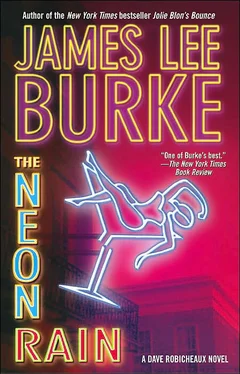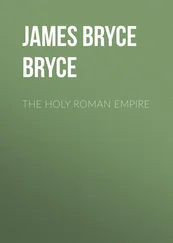When I walked away from the house, the fire had already cracked through the shingles of the kitchen roof and I could see the rain turning in the red light.
I drove along the beach boulevard next to the sea wall in the dark. The surf was loud, the waves crashing hard on the sand, and the shrimp boats that were moored in their slips were knocking against the pilings. I passed Beauvoir, the rambling, one-story home of Jefferson Davis, set back on a dark lawn under spreading oak trees. The wide veranda was lighted, and in the darkness and the sweep of rain through the trees, the building seemed like an inverted telescopic vision into that spring of 1865 when Davis watched his failed medieval romance collapse around him. If the grass in that same lawn was a darker green than it should have been, perhaps it was because of the two hundred Confederate soldiers who were anonymously buried there. The road to Roncevaux lures the poet and the visionary like a drug, but the soldier pays for the real estate.
I turned north and followed the road to a pink stucco duplex at the end of an unfinished subdivision. There was no moon, the sky was totally black now, and I parked my car down the street under a dripping oak tree. Murphy wasn't going to be easy, and I had to make some decisions. My father used to say that an old armadillo is old because he's smart, and he doesn't leave his hole unless you give him an acceptable reason. I had packed a change of clothes and a raincoat and a rain hat in a small suitcase before I had left New Orleans. I put on the hat and coat, slipped the shotgun out of its sheep-lined cover, and hung it through the trigger guard from under my armpit with a coat hanger. I buttoned the coat over the shotgun and walked to the duplex, which was set apart from the other houses by a vacant lot filled with construction rubble.
Both sides of the duplex were dark, but the driveway on the far side was empty and newspapers moldered on the lawn. I went behind the apartment closest to me, cut the telephone wire at the box with my Puma knife, and unscrewed the lightbulb on the porch. The rain beat against my hat and coat, and the shotgun knocked against my side and knee like a two-by-four. I pulled my hat low on my eyes, put a pencil between my teeth, then hammered on the door with my fist and stepped back out into the rain.
A light went on in back, and a moment later I saw the curtain move behind the door glass.
"Who is it?" a voice called.
"Gulf Coast Gas and Electric. We got a busted main. Turn off your pilot."
"What?" the voice asked from behind the door.
"The main's busted. We can't get it shut down at the pump station. If you smell gas, go to the National Guard armory. Don't light no matches, either," I said, and walked into the darkness as though I were headed toward another house.
But instead I cut behind a pile of bulldozed fiberboard in the vacant lot next door, circled through a stand of pines along a coulee, and came out in back of the duplex. I suspected that Murphy had stayed at the window until he gave up trying to locate me in the darkness and rain, then had gone to the telephone. I was right. As I eased under the window I heard him dialing, a pause, then the receiver rattling in the cradle. I stooped and walked quickly along the side wall toward the front porch, trying to keep the barrel of the shotgun out of the mud. At the corner I stopped and listened. He unlocked the deadbolt and opened the door on the chain.
Come on, you've got to prove you have cojones , I thought. Big boys wear them on the outside of their pants. You kicked gook ass with the Legionnaires, crouched in the bottom of an LST at the Bay of Pigs, hung parts of Sandinista farmers in trees like Christmas-tree ornaments. What good is life if you're not willing to risk it?
Then I heard him slide the chain and let it swing back against the door. I raised the shotgun in front of me, my body pressed tightly against the stucco wall. He stepped out into the slanting rain, his pajama top unbuttoned over his white pot belly, a flashlight in one hand and a blue two-inch.38 in the other.
I clicked off the safety and came around the corner and aimed the twelve-gauge's barrel at the side of his head in one motion.
"Throw it away! Don't think about it! Do it!" I said.
He was frozen, the flashlight's glow illuminating his face like a piece of dead wax. But I could see thought working in his eyes.
"I'll cut you in half, Murphy."
"I suspect you would, Lieutenant," he said, and he bent his knees, almost as though he were going to genuflect, and set the revolver on the porch slab.
I pushed him inside, turned on the light switch, and kicked the door closed behind me.
"Facedown on the floor, arms straight out," I said.
"We don't need all this street theater, do we?" He looked again at my face in the light. "All right, I don't argue. But there's nobody else here. It looks like you've won the day."
The inside of the duplex looked like a motel room. An air-conditioning unit hummed in one window and dripped water on the shag carpet; the wallpaper had been roller-painted a pale green; the furniture was either plastic or made of composite wood; the air smelled of chemical deodorizer. I looked quickly in the bedroom, the bath, the small kitchen and dinette.
"It's a simple place," he said. He had to turn his head sideways on the rug to talk. The pink fat around his hips was striped with gray hair. "No women, no guns, no mysteries. This might be a disappointing bust for you, Lieutenant."
"Take off your shirt and sit in that chair."
"All right," he said, and a smile flickered around the corner of his lips.
"Do I amuse you for some reason?"
"Not you. Just your attitude. I told you once before you had puritan sympathies. At some point in your career, you need to realize that nobody cares about these things. Oh, they say they do. But they really don't, and I think you know it."
He dropped his pajama top on the arm of a stuffed chair and sat down. His chest was small and gray, and his stomach pushed up high on his breastbone.
"Turn them up," I said.
He shrugged his shoulders and turned up his forearms so I could see the flat, gray scar tissue along the veins. The scars were so thick they could have been traced there with a barber's razor.
"I heard you were just a two-pop-a-day man. I think you've worked up to the full-tilt boogie," I said.
"Does that somehow make you feel better?" The smile was gone, and I could see the contempt, the cynicism, the glint of evil in his eyes.
"If I allowed myself to have feelings about you, I would have blown you up on the porch."
"And we thought you were a professional."
"I hope you shot up a lot of dope tonight. You're going on a long dry. Figure what it's going to be like after two days in lockdown."
"I'm trembling already. See the cold sweat on my face. Oh Lawsie, what's I going to do?"
At that moment I felt a genuine rush of hatred in my chest.
"If my brother dies and you somehow get back on the street, God help you," I said.
"Your brother?"
I watched his face carefully.
"He's still alive, and he saw the guy you sent to do it," I said.
"You think we tried to kill your brother?"
I watched the bead of light in his eyes, the curve of his palms on the arm of the chair.
"That's what all this bullshit is about? Somebody hit your brother and you think we were behind it?" he said.
He widened his eyes, pursed his lips with his own question. He started to smile but glanced at my face and thought better of it.
"I'm sorry to tell you this, old boy. It wasn't us," he said. "Why would we want to hurt your brother?"
"He looks like my twin."
"Ah yes, I heard something like that. Give us our innings, though. We don't make those kinds of mistakes, at least not as a rule. Actually, we'd marked you off, thought you'd be working on some of your own problems for a while."
Читать дальше












